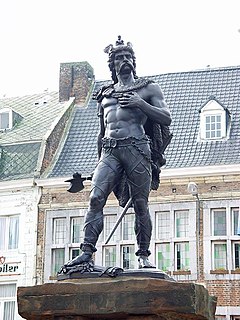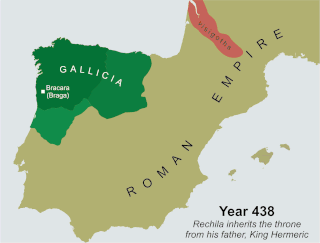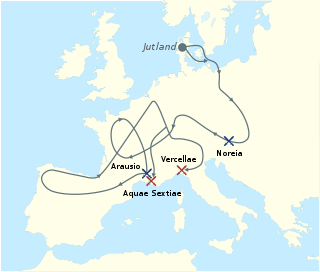 W
WAmbiorix was, together with Cativolcus, prince of the Eburones, leader of a Belgic tribe of north-eastern Gaul, where modern Belgium is located. In the nineteenth century Ambiorix became a Belgian national hero because of his resistance against Julius Caesar, as written in Caesar's Commentarii de Bello Gallico.
 W
WBrinno was leader of the Canninefates when they joined in the Batavian rebellion at the mouth of the Rhine in AD69. According to Tacitus he was:...a man of a certain stolid bravery and of distinguished birth. His father, after venturing on many acts of hostility, had scorned with impunity the ridiculous expedition of Caligula. His very name, the name of a family of rebels, made him popular. Raised aloft on a shield after the national fashion, and balanced on the shoulders of the bearers, he was chosen general".
 W
WThe Haddingjar refers on the one hand to legends about two brothers by this name, and on the other hand to possibly related legends based on the Hasdingi, the royal dynasty of the Vandals. The accounts vary greatly.
 W
WHygelac was a king of the Geats according to the poem Beowulf. It is Hygelac's presence in the poem which has allowed scholars to tentatively date the setting of the poem as well as to infer that it contains at least some points of historical fact. Beowulf gives Hygelac's genealogy: according to the poem, he was the son of Hrethel and had two brothers Herebeald and Hæþcyn, as well as an unnamed sister who was married to Ecgtheow and mother of the hero Beowulf. Hygelac was married to Hygd, and they had a son Heardred and an unnamed daughter who married Eofor. When Hygelac's brother Hæþcyn was fighting with the Swedes, Hygelac arrived at Hrefnesholt one day too late to save his brother Hæþcyn, but he managed to rescue the surviving Geatish warriors, who were besieged by the Swedish king Ongentheow and his three sons. The Swedes found refuge at a hill fort but were assaulted by the Geats. In the battle, the Swedish king was slain by Eofor. After the death of his brother Herebeald, Hygelac ascended the Geatish throne. After he was killed during a raid on Frisia, Hygelac was succeeded by Heardred, according to Beowulf.
 W
WGaius Julius Civilis was the leader of the Batavian rebellion against the Romans in 69 AD. His nomen shows that he was made a Roman citizen by either Augustus or Caligula.
 W
WFlavius Odoacer, also spelled Odovacer or Odovacar, was a soldier and statesman of barbarian background, who deposed the child emperor Romulus Augustulus and became King of Italy (476–493). Odoacer's deposition of Romulus Augustulus is traditionally seen as marking the end of the Western Roman Empire as well as Ancient Rome.
 W
WMarcus Cassianius Latinius Postumus was a Roman commander of Batavian origin who ruled as Emperor in the West. The Roman army in Gaul threw off its allegiance to Gallienus around the year 260, and Postumus assumed the title and powers of Emperor in the provinces of Gaul, Germania, Britannia and Hispania, thereby founding what scholars have dubbed the Gallic Empire. He ruled for the better part of ten years before he was murdered by his own troops.
 W
WRechila was the Suevic King of Galicia from 438 until his death. There are few primary sources for his life, but Hydatius was a contemporary Christian (non-Arian) chronicler in Galicia.
 W
WFlavius Ricimer was a Romanized Germanic general who effectively ruled the remaining territory of the Western Roman Empire from 461 until his death in 472, with a brief interlude in which he contested power with Anthemius. Deriving his power from his position as magister militum of the Western Empire, Ricimer exercised political control through a series of puppet emperors.
 W
WKing Rodulf was king of the Heruli kingdom on the Middle Danube in the period around 500, and possibly of Scandinavian origin. He died in a battle with the neighbouring Lombards which led to the splitting up of the Heruli. He is probably the same Heruli king that Theoderic the Great wrote to in two surviving letters, in one of which Theoderic "adopted" him with a gift of arms. Less certainly, he is also sometimes equated to a King Rodulf that Jordanes mentions as having come from Scandinavia to Italy, to join Theoderic.
 W
WTeutobod was a king of the Teutons, who, together with the Cimbri invaded the Roman Republic in the Cimbrian War, won a spectacular victory at the Battle of Arausio in 105 BC. He was captured at the Battle of Aquae Sextiae in 102 BC.